View in other NatureServe Network Field Guides
NatureServe
Montana
Utah
Wyoming
Idaho
Wisconsin
British Columbia
South Carolina
Yukon
California
New York
Red Sage - Kochia americana
Other Names:
Green Molly,
Bassia americana
State Rank Reason (see State Rank above)
The species is at the periphery of its range in Beaverhead County where it is known from one large extant population on BLM and private lands, two historical locations and two other locations that need additional survey work. Agricultural conversion has significantly reduced available habitat. Additional impacts to K. americana from agriculture, grazing and/or invasive weeds are possible.
General Description
Red Sage is a perennial subshrub having a woody base and simple or branched, herbaceous stems that are up to 5 dm high. The alternate, fleshy, linear leaves are 5-25 mm long. Foliage is sparsely long-hairy. Small clusters of 2-5 tiny, sessile flowers are borne in the axils of the upper leaves. The 5 hairy calyx lobes are 1-2 mm long, surround the ovary and 5 stamens, and completely cover the 1-seeded fruit. Petals are lacking.
Phenology
Flowering from June-August.
Diagnostic Characteristics
Some species of Suaeda are also subshrubs with linear, succulent leaves, but their flowers and leaves are glabrous.
Species Range
Montana Range
Range Descriptions
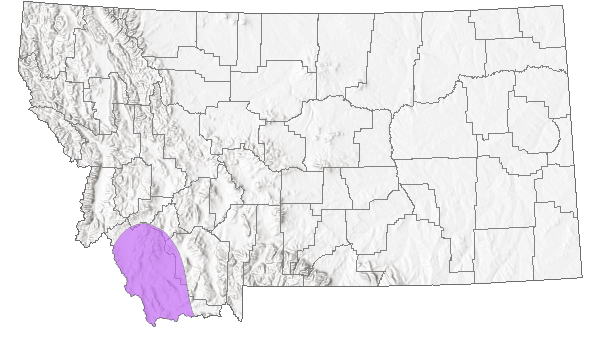
 Native
Native
Range Comments
In MT in Beaverhead County; OR to MT south to CA, NM and TX (Lesica et al. 2012. Manual of Montana Vascular Plants. BRIT Press. Fort Worth, TX).
Observations in Montana Natural Heritage Program Database
Number of Observations: 8
(Click on the following maps and charts to see full sized version)
Map Help and Descriptions
Relative Density
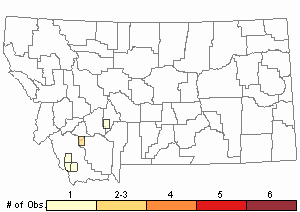
Recency
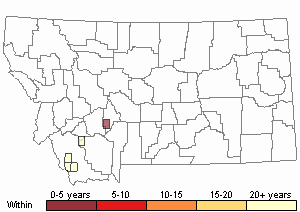
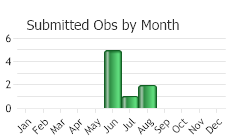
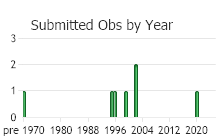
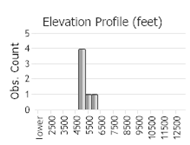 (Observations spanning multiple months or years are excluded from time charts)
(Observations spanning multiple months or years are excluded from time charts)
Habitat
Saline or alkaline soil in valleys and foothills.
National Vegetation Classification System Groups Associated with this Species
Shrubland
Arid - Saline Shrubland
Sagebrush Shrubland
Grassland
Lowland - Prairie Grassland
Wetland and Riparian
Alkaline - Saline Wetlands
Stewardship Responsibility
Threats or Limiting Factors
STATE THREAT SCORE REASON
Reported threats to Montana's populations of Red Sage (Kochia americana) are currently assigned as unknown. Land-use conversion to agricultural purposes has eliminated most of the potential habitat where Red Sage may have colonized. But, existing risks, are not well known. Concern that remaining habitat may be at risk of land use conversion, or knowledge that non-native plants are impacting Red Sage populations must be substantiated before a threat rank can be assigned (MTNHP Threat Assessment 2021).
References
- Literature Cited AboveLegend:
 View Online Publication
View Online Publication Lesica, P., M.T. Lavin, and P.F. Stickney. 2012. Manual of Montana Vascular Plants. Fort Worth, TX: BRIT Press. viii + 771 p.
Lesica, P., M.T. Lavin, and P.F. Stickney. 2012. Manual of Montana Vascular Plants. Fort Worth, TX: BRIT Press. viii + 771 p. MTNHP Threat Assessment. 2021. State Threat Score Assignment and Assessment of Reported Threats from 2006 to 2021 for State-listed Vascular Plants. Botany Program, Montana Natural Heritage Program, Helena, Montana.
MTNHP Threat Assessment. 2021. State Threat Score Assignment and Assessment of Reported Threats from 2006 to 2021 for State-listed Vascular Plants. Botany Program, Montana Natural Heritage Program, Helena, Montana.
- Additional ReferencesLegend:
 View Online Publication
View Online Publication
Do you know of a citation we're missing? Blackwell, W.H. Jr., M.D. Baechle, and G. Williamson. 1978. Synopsis of Kochia (Chenopodiaceae) in North America. Sida 7(3):248-254.
Blackwell, W.H. Jr., M.D. Baechle, and G. Williamson. 1978. Synopsis of Kochia (Chenopodiaceae) in North America. Sida 7(3):248-254. Heidel, B.L. and J. Vanderhorst. 1996. Sensitive plant species surveys in the Butte District, Beaverhead and Madison Counties. Unpublished report to the Bureau of Land Management. Montana Natural Heritage Program, Helena, Montana.
Heidel, B.L. and J. Vanderhorst. 1996. Sensitive plant species surveys in the Butte District, Beaverhead and Madison Counties. Unpublished report to the Bureau of Land Management. Montana Natural Heritage Program, Helena, Montana. Lesica, P., M.T. Lavin, and P.F. Stickney. 2022. Manual of Montana Vascular Plants, Second Edition. Fort Worth, TX: BRIT Press. viii + 779 p.
Lesica, P., M.T. Lavin, and P.F. Stickney. 2022. Manual of Montana Vascular Plants, Second Edition. Fort Worth, TX: BRIT Press. viii + 779 p.
- Web Search Engines for Articles on "Red Sage"





